#a rape in cyberspace
Explore tagged Tumblr posts
Text
i think the part of A Rape In Cyberspace that caught my attention the most on this read-through a few days ago was the part where they are convening the meeting of the MOO users to discuss what to do about the rapist and he finally shows up and they ask him what the fuck is his problem. and he says it was a social experiment. and the description of the reaction of the crowd is really interesting
“Asshole,” spat Karl Porcupine, “creep.” But the harshest of the MOO’s hostility toward him had already been vented, and the attention he drew now was motivated more, it seemed, by the opportunity to probe the rapist’s mind, to find out what made it tick and if possible how to get it to tick differently. In short, they wanted to know why he’d done it. So they asked him. And Mr. Bungle thought about it. And as eddies of discussion and debate continued to swirl around him, he thought about it some more. And then he said this: “I engaged in a bit of a psychological device that is called thought-polarization, the fact that this is not RL simply added to heighten the affect of the device. It was purely a sequence of events with no consequence on my RL existence.” They might have known. Stilted though its diction was, the gist of the answer was simple, and something many in the room had probably already surmised: Mr. Bungle was a psycho. Not, perhaps, in real life — but then in real life it’s possible for reasonable people to assume, as Bungle clearly did, that what transpires between word-costumed characters within the boundaries of a make-believe world is, if not mere play, then at most some kind of emotional laboratory experiment. Inside the MOO, however, such thinking marked a person as one of two basically subcompetent types. The first was the newbie, in which case the confusion was understandable, since there were few MOOers who had not, upon their first visits as anonymous “guest” characters, mistaken the place for a vast playpen in which they might act out their wildest fantasies without fear of censure. Only with time and the acquisition of a fixed character do players tend to make the critical passage from anonymity to pseudonymity, developing the concern for their character’s reputation that marks the attainment of virtual adulthood. But while Mr. Bungle hadn’t been around as long as most MOOers, he’d been around long enough to leave his newbie status behind, and his delusional statement therefore placed him among the second type: the sociopath. And as there is but small percentage in arguing with a head case, the room’s attention gradually abandoned Mr. Bungle and returned to the discussions that had previously occupied it.
it's the idiot vs villain dichotomy spelled out very clearly, one we still deal with on a daily basis online. poe's law, and before that, hanlon's razor. it stuck out to me a lot this time, im not sure why
edit; i also completely forgot about the twist. i forgot there even was one, but its a doozy
31 notes
·
View notes
Text
TW: Trans activists
For more than a decade now, trans activists have been harassing those who belong to a feminist philosphy we call radical feminism or the women’s liberation movement.
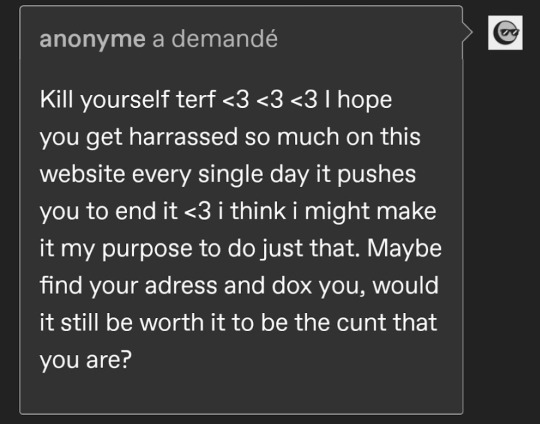
Radical feminists, like most feminists, believe that men use sex to oppress women. Meaning they oppress women through sexual exploitation and by perpetuating sexist discrimination towards those who belong to the female sex. They were the first to research and expose violence against women as endemic and traumatizing, and to create shelters for rape and domestic violence victims. Those shelters are now being vandalized and defunded by trans activists.
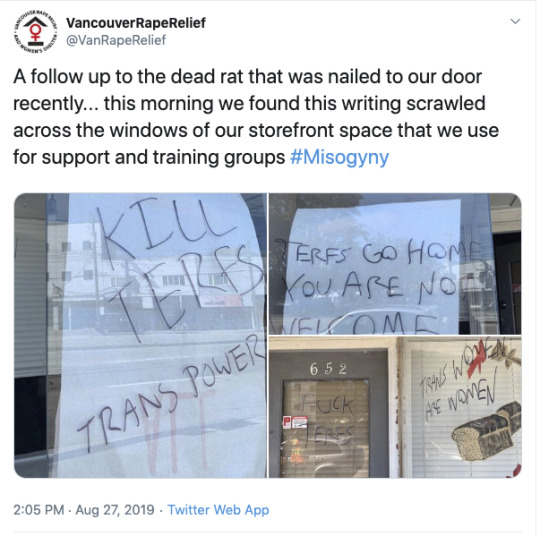
Because radical feminists don’t believe in gender identities, gendered souls, gender roles or any form of innate personality based on sexist stereotypes, they have been receiving rape and death threats on a daily basis. The acronym “terf” was soon invented and is now used to describe any person who doesn’t support the trans movement, even if they’re not feminists, just as long as they're women, though lesbians and feminists tend to be the primary targets.

As a whole, the trans movement claims that its biggest enemy and threat, its most pressing matter, its most dangerous opponent is the women’s liberation movement or what they call “radfems” or “terfs”. This is where their energy and anger is directed, typically in the form of sexist and sexual harassment, intimidation techniques, violence, censorship and social isolation. So let’s talk about that.
From the book Hate Crimes in Cyberspace:
Cyber harassment involves threats of violence, privacy invasions, reputation-harming lies, calls for strangers to physically harm victims, and technological attacks.


Victims’ in-boxes are inundated with threatening e-mails. Their employers receive anonymous e-mails accusing them of misdeeds. Even if some abuse is taken down from a site, it quickly reappears on others. Victims’ sites are forced offline with distributed-denial-of-service attacks.

While some attackers confine abuse to networked technologies, others use all available tools to harass victims, including real-space contact. Offline harassment or stalking often includes abusive phone calls, vandalism, threatening mail, and physical assault.
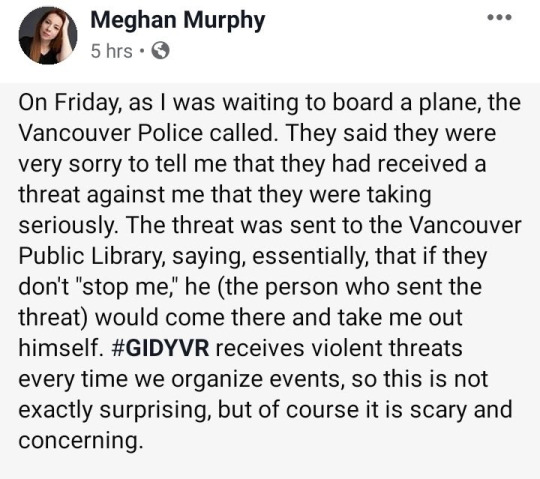
The Internet extends the life of destructive posts. Harassing letters are eventually thrown away, and memories fade in time. The web, however, can make it impossible to forget about malicious posts. And posts that go viral attract hundreds of thousands of readers.
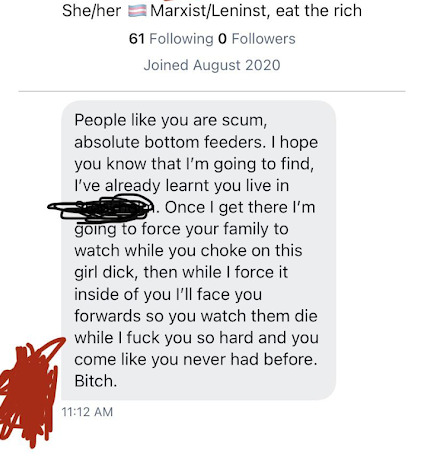
Online harassment can quickly become a team sport, with posters trying to outdo each other. Posters compete to be the most offensive, the most abusive. An accurate name for such online groups is cyber mobs. The term captures both the destructive potential of online groups and the shaming dynamic at the heart of the abuse.

Cyber harassment disproportionately impacts women. The U.S. National Violence Against Women Survey reports that 60 percent of cyber stalking victims are women, and the National Center for Victims of Crimes estimates that the rate is 70 percent. Of the 3,393 individuals reporting cyber harass-ment to WHOA from 2000 to 2011, 72.5 percent were female. The most recent Bureau of Justice Statistics report found that 74 percent of individuals who were stalked on or offline were female, and 26 percent were male.

Researchers found that users with female names received on average one hundred “malicious private messages,” which the study defined as “sexually explicit or threatening language,” for every four received by male users.

According to the study, “Male human users specifically targeted female users.” By contrast, men are more often attacked for their ideas and actions. John Scalzi, a science fiction author and popular blogger, has found online invective typically situational. When he writes something that annoys people, they tell him so. People do not make a “hobby” out of attacking his appearance and existence as they do female bloggers.
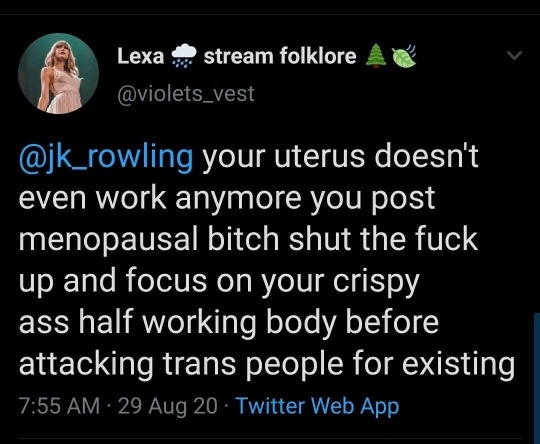
The nature of the attacks similarly attests to bigotry’s presence. Hate expresses something uniquely damaging. It labels members of a group as inhuman “others” who do not possess equal worth. It says that group members are inferior and damaged. Bigotry conveys the message that group members are objects that can be destroyed because they have no shared humanity to consider.
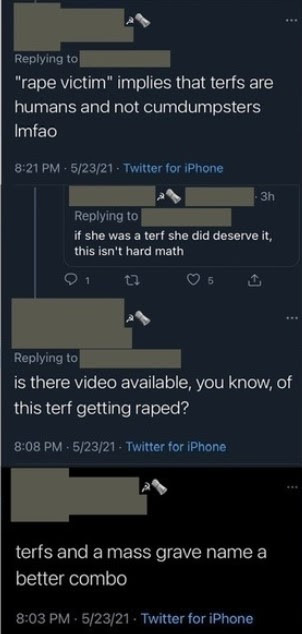
Cyber harassment exploits these features by exposing victims’ sexuality in humiliating ways. Victims are equated with their sexual organs, often described as diseased.


Once cyber harassment victims are sexually exposed, posters penetrate them virtually with messages that say “I will fuck your ass to death you filthy fucking whore, your only worth on this planet is as a warm hole to stick my cock in.”
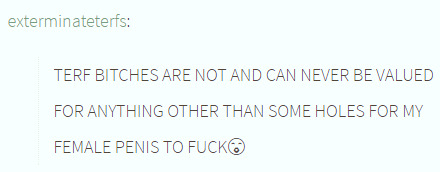

Rape threats profoundly impact women: over 86 percent of rape victims are female. Virtual elimination may follow the imagined penetration: “First I’ll rape you, then I’ll kill you.”


One woman who faced online abuse noted, “Someone who writes ‘You’re just a cunt’ is not trying to convince me of anything but my own worthlessness.” Despite the gravity of their predicaments, cyber harassment victims are often told that nothing can or should be done about online abuse. Journalists, bloggers, lay observers, and law enforcement officials urge them to ignore it. Victims are called “whiny baby girl[s]” who are overreacting to “a few text messages.” Often victims are blamed for the abuse. They are scolded for sharing their nude images with loved ones or for blogging about controversial topics. They are told that they could have avoided the abuse had they been more careful.

A related message sent to victims is that the benefits of online opportunities are available only to those who are willing to face the Internet’s risks. They are advised not to expect anything different if they want to make a name for themselves online. The choice is theirs: they can toughen up or go offline.
The Internet is governed by society’s rules. Life online bleeds into life offline and vice versa. The notion that more aggression should be tolerated in cyberspace than in real space presumes that virtual spaces are cordoned off from physical ones.
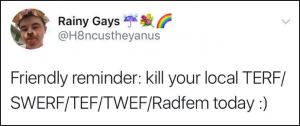
Most victims do not report cyber harassment to the police because they assume that nothing will be done about it. Sadly, they are right. Law enforcement frequently fails to act on victims’ complaints even though criminal law would punish some of the behavior. Victims are told to turn off their computers because “boys will be boys.” Online harassment victims are told that nothing can be done; they are advised to ignore rape and death threats. During the summer of 2013, high-profile women were subjected to a torrent of online threats. The feminist activist Caroline Criado Perez received hundreds of graphic rape threats via Twitter after her successful campaign to feature more female images on British banknotes.

Members of Parliament and female writers who publicly supported Criado-Perez faced the same, including bomb threats. One tweet featured a picture of a masked man holding a knife with the message, “I’m gonna be the first thing u see when u wake up.”

Because the Internet serves as people’s workspaces, professional networks, résumés, social clubs, and zones of public conversation, it deserves the same protection as offline speech. No more, no less.
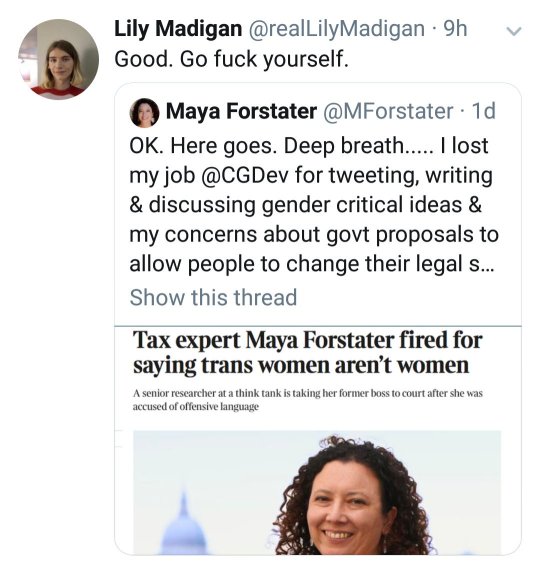
Without doubt, the free speech interests at stake are weighty. Free expression is crucial to our ability to govern ourselves, to express our thoughts, and to discover truths. For that reason, government cannot censor ideas because society finds them offensive. Truthful speech must not be banned just because it makes people uncomfortable.

But credible threats, certain defamatory falsehoods, social security numbers, and nude images posted without consent contribute little to discourse essential for citizens to govern themselves and discover truths. Their net effect is the silencing of victims. Victims could blog, post videos, and engage on social networks without fear of destructive cyber harassment. They could raise money using networked tools unencumbered by rape threats, reputation-harming lies, and distributed- denial- of- service attacks. They could take advantage of all of the expressive opportunities available online. Protecting against online harassment would secure the necessary preconditions for victims’ free expression.

With the help of law and the voluntary efforts of Internet intermediaries, parents, and teachers, we might someday achieve a free and equal Internet. We need to take action before cyber harassment becomes a normal feature of online interactions. A hostile online environment is neither inevitable nor desirable. We should not squander this chance to combat discriminatory online abuse; it is early enough in our use of networked tools to introduce equality of opportunity as a baseline norm of interaction.

288 notes
·
View notes
Note
Ya know. This whole stupid thing of the IDW cast constantly preaching about how compashionate they are against a bunch of evil lunaticks, and Sonic with his declaration of freedom reminds me of something.
Are you aware of the prisons in Norway? These inmates don't even get treated like criminals. Their "cells" are just small houses. They cook, clean, hang around with animals, swim and relax. And in a high secuirity prison, the guards don't even carry guns. They get a library, music studio to create songs, have their own keys to their own rooms, etc.
Americans would be baffled if they see this, but Norway claims that it is based off of their founding fathers. "No cruel or unusual punishment"
Their maximum sentence is 21 years, and you only get executed if you did some BAAAD shit. Their focus is rehabilitation, not revenge. IDW Sonic SEEMS to hint at this, only, there is one big difference...
THEY ARE LOCKED UP.
It raises the question of what is the purpose of incarcerating people who break the law? Is it punishment? Rehabilitation? Simply to remove the law breakers from lawful society? Some combination of two or all?
It is sad that in America, the knee jerk answer that most people have been conditioned to have is that the purpose of incarcerating criminals is punishment. You didn't follow the rules, or you broke the rules, so now you have to sit in time out. And all but the most white collar of American prisons are only SLIGHTLY above the level of cruel and unusual confinement compared to people being thrown in the oubliette in medieval society.
It would indeed be baffling to someone raised in American society to hear about a prison system where criminals are all effectively just under house arrest. "Whats the downside of breaking the law?" Sorry to get in my high horse but this is just another example of America still being brainwashed by Christian religious values. Because one of the arguments Christians will sometimes say against the concept of Atheism is "if you don't believe you'll go to hell when you die, then why don't you just run around stealing and raping and murdering people?" or along those lines.
It doesn't seem to occur to them that in a high trust society people don't NEED to be threatened with punishment to convince them to contribute to society instead of disrupting it. I don't believe that I'll go to hell for my sins when I die. So I do indeed rape and murder the exact number of people that I want to. It's just that the number of people I WANT to rape and murder IS ZERO.

Prisons being nice or hellish doesn't have any influence or impact on my desire to break the law, because I don't WANT to break the law. There isn't a single law that carries a sentence of jail time for violating it that I feel tempted to break. And frankly if you presented me with one, then I would most likely conclude that it is an unjust law that should be repealed andor revolted against.
The only prison that we've ever seen in existence in the universe of Sonic is the cell on Prison Island that GUN threw Gerald and later Sonic into. And the space prison on the Death Egg in Sonic Forces, the one that EGGMAN was throwing people into. Prisons are utilized by THE VILLAINS in Sonic. Sonic is OPPOSED to the plan of sealing Chaos back into the Master Emerald in Sonic Adventure, and the possibility of sealing The End back away into Cyberspace is never even floated by him. The morality of the Sonic the Hedgehog universe is clearly presented as Prisons = Bad. Sonic and Co have never and would never throw a bad guy into prison, that would go completely against the demonstrated values of the narrative as presented.
Punitive action against villains is always simply to put a stop to their evil deeds and plans, and to remove them from the immediate area in the process. (Whether they live or die as a consequence is really only a matter of how resilient the villain happens to be. It is certainly NOT a CHOICE that Sonic is making to execute or spare them, he just wants to Stop Them and if they happen to die then that's just the way the cookie crumbles.) And it is that way for the same reason that the worst thing that happens to Team Rocket is they get sent Blasting Off Again. This is a simple action adventure story meant for children, it is not interested in exploring that question of punishment vs rehabilitation vs removal. Because that's not what the purpose of the story this series is telling is about.
And Ian Flynn is also CLEARLY not interested in that question either. But in his case it's because he's a brainwashed north American who thinks the purpose of incarceration is punishment. Which is why he thinks Sonic should be against it as a concept, and thus "always lets [the villain] go." But he's such an incompetent writer that he sidesteps the pothole and falls into an bottomless pit, because now he's presenting Sonic as an intolerant tyrant who says that everyone needs to live their lives according to his values, or else he will inflict punitive violence against them. He's also very overtly still Archie Brained, because in Archie the "good guys" did indeed throw criminals into prison, and the question is never explored there either because it was in the default North American "prisons are to punish law breakers" values. So the Sonic we see in IDW is the result of Ian Flynn TRYING to write the character accurately to the games but he doesn't UNDERSTAND the character from the video games, and he's just filling in the blanks with what he remembers writing for the character back in Archie.
Basically all that to say: IDW Sonic is a cluster fuck.
#sonic#sonic the hedgehog#idw sonic#sonic idw#foxeh reads idw#ian flynn#archie sonic#prison industrial complex
9 notes
·
View notes
Text
Blog Post #5
How do you think race is different online compared to real life?
Race is different online because people think there are no consequences and feel invincible since it is online. There are many instances online where racism is promoted and laughed at since it is online they feel like it's not a big deal but it does affect people negatively.
How does the term referring to Asians contribute to racism in media?
It contributes to racism in the media because it shows the promotion of a racist term as the title of a video game. In “ The Revenge of the Yellow-faced Terminator”, it states, "a game that is patently offensive in its racial humor and, even worse, shows great ignorance about its very own subject matter: East Asia and ninjas" (221). Proud of its ability to ignite conflict, 3D Realms continued to promote its racist and sexist agendas” (Pg.4). This shows that even the creators of the game did not realize even the name itself was contributing to racism. They still decided to promote it even with backlash.
How does a merit system relate to real life?
The episode of Black Mirror titled “Nosedive” shows the usage of this merit system which rates people based on interactions. It shows how your rating in society dictates your life. Compared to real life where we show our personalities through social media. If you have a good presence on social media people will like you, if you are more of a bad presence people will hate on you. An actual example can include apps like Uber and Doordash, where their ratings are vital to their success. If they get a 1 star it affects how people view them as opposed to someone who has 5 stars.
How does cultural racism show up in video games?
Cultural racism is shown through many video games. As I talked about earlier video game creators often promote and intentionally show racist and sexist things in the game. A good example is GTA the video game where they show racist and sexist scenes, often disguised as banter and this is a game that has been bought by millions and millions of people. In those games, they often amplify stereotypes and when millions of people are tuned in to play especially kids this will start to affect their brain and how they see the world.
Kolko, B. E., Nakamura, L., & Rodman, G. B. (2000). Race in cyberspace. Routledge.
Ow, Jeffrey A. “The Revenge of the Yellowfaced Cyborg Terminator: The Rape of Digital Geishas and the Colonization of Cyber-Coolies in 3D Realms’ Shadow Warrior.” Asian America.Net: Ethnicity, Nationalism, and Cyberspace.
Wright, J. (2016, October 21). Black Mirror: Nosedive. Netflix.
Nakamura, Lisa. “5 Types of Online Racism and Why You Should Care.” TEDxUIllinois, 19 Nov. 2015, https://www.youtube.com/watch?v=DT-G0FlOo7g&t=24s
9 notes
·
View notes
Text
Blog Post #5 (10/3/24)
How has the gamification of violence impacted children's view on violence?
Violence in video games has lessened the impact of how real the consequences are. In many games, the killing, raping, murdering of people, especially women, has become a normal part of the game. Committing these acts are needed to win the game in most circumstances. Fickle discusses, "Did it [Pokemon GO] not, by making requisite such discomfort as might otherwise be avoided or at least anticipated in daily life, actively reify the abstract fact of inequality with an unpleasantly vivid material reality?"(pg. 1, Introduction). When games begin to make violence normalized and present it in a palatable way for children, children begin to believe this is normal behavior. Children begin to reinforce this behavior through the way they interact with others and have a normalized sense of that this behavior is accepted in the world.
How has the internet increased the spreading of misinformation?
Misinformation has become so heavily widespread across various media platforms that it has affected the ways in which people consume information. The internet has impacted the way information is presented and then consumed. As opposed to only getting your news from trusted news sources, the internet has allowed for people and independently-ran sources to present news. Although discourse about news is encouraged on social media platforms, it creates an outlet for people to spread personal opinion and call it fact. Without a proper caution to believing everything you see online, people can begin to believe personal bias and opinion as fact, and this would create a loophole of misinformation constantly being spread.
Does the usage of race in video games reflect society's beliefs on race-related topics?
Video games including race and creating scenarios in which a character's race is their entire storyline does reflect society's consistent uncomfort with race-related topics. Discussed by Fickle, games are meant to be an alternate reality, and this alternative reality still harbors the same constraints and notions related to race and gender. Games were created to be an outlet from regular routine, for many an escape. This escape has only been subjected to the same prosecutions the world has been subjected to involving socially constructed viewpoints to become integrated into the game's development. Kolko said, "As mentioned earlier, users bring their assumptions and discursive patterns regarding race with them when they log on, and when the medium is interactive, they receive such assumptions and patterns as well"(pg 9, Race in Cyberspace). Although thoughts of race is developed within the game, in online spaces, discussions of race are also present and involve users presenting opinions on race, most often in negative ways.
How can society be critically aware of their consumption of bias related to race in media?
It's important that society critically analyzes the usage of race and discussion related to race online. Race being a socially constructed topic will always create for discourse surrounding it, but that discourse can be used to present justice to those impacted by negative notions. Society needs to have a clear understanding that race continues to be a prevalent topic of discussion because of media's infatuation with the topic, and the constant discussion of race. Kolko wrote, "Cyberspace and race are both constructed cultural phenomena, not products of "nature"; they are made up of ongoing processes of definition, performance, enactment, and identity creation"(pg. 10). The role that race plays in all of media is due to the constant discussion of the topic, which lies at the fault to that differences have not been accepted, and policy allows for these differences to fester.
Fickle, T. (2019). The Race Card: From Gaming Technologies to Model Minorities. New York University Press.
Kolko, B. E., Nakamura, L., & Rodman, G. B. (2000). Race in cyberspace. Routledge.
6 notes
·
View notes
Text
Blog 5
How can video games create even more inequality in our world?
Although there are a variety of free video games on the internet, many of them can still require you to spend money. There are many games who produce packs, skins, emotes, and many other exciting additions to their games, that require their players to spend money. This can create inequality within the game as not every player has access to the amount needed. This can lead to disadvantages for some players as they aren't able to buy these special packs that can help them with the continuation of their game. With the disadvantage of not being able to purchase these extras, some people can feel excluded, or even begin to experience online trolling, because other players are able to.
Should video games face stricter regulations?
As shared in “The Revenge of the Yellow Faced Cyborg Terminator” many video games hold and put out so much violence into the world we live in. Although shooting and violent games can be fun, is there a point where it is too much? In these violent games there are so many grotesque thoughts and ideas that can be put into peoples heads. Games can also create violence from player to player creating toxic gaming environments and experiences. We already see so much of the toxicity in the gaming community, so why aren't there more restrictions?
How does the racism experienced in gaming impact those players?
As stated in my previous paragraph, online gaming is not always so nice. Many people are trolled and harassed when playing these games. Online racism is unfortunately very common in the gaming world. In many games, especially COD, there are many ragers who throw out so many racist, homophobic, and other hurtful comments at any given moment. This can isolate the individuals who are being told these rude comments and affect their mental health. The targeted players can then become depressed and gain a lot of stress from these toxic environments.
How are parents and their children affected by video games?
A lot of parents nowadays no longer closely monitor their child's screen time. Children are sometimes just handed a phone, tablet, or game console without regulations. This allows the child to have free access to what is on the internet, which can lead to them playing violent games or going into websites they shouldn't be allowed into. This then puts these violent and mature contents into the child's head which can create a harmful mindset for the child to grow up with. They will grow up thinking these violences are okay in the real world as their parents aren't telling them anything to prevent them from these types of contents.
Kolko, B. E., Nakamura, L., & Rodman, G. B. (2000). Race in cyberspace. Routledge.
Ow, Jeffrey A. “The Revenge of the Yellowfaced Cyborg Terminator: The Rape of Digital Geishas and the Colonization of Cyber-Coolies in 3D Realms’ Shadow Warrior.” Asian America.Net: Ethnicity, Nationalism, and Cyberspace.
Brooker, C. (Writer), Wright, J. (Director). (2016, October 21). Nosedive (Season 3, Episode 1) [TV series episode]. In A. Jones, C. Brooker (Executive Producers), Black Mirror. Zepportron.
4 notes
·
View notes
Text
Blog Post #8
How do I identify a troll from a person?
In one of our readings from this week “The Origins of Trolling” by Phillips we see the discussion of how to know if you are speaking to a troll. A troll can be faking it all or just barely faking it. The reading says a troll can fake its entire persona this being religious, age. Careers are sometimes faked as well. These are things people would consider things that make you, you. Meaning knowing someone is faking these makes them a troll. Our reading says “...often repeated joke/reassurance/warning..”(Phillips,62) these can also be signs or alerts that you are speaking to a troll.
What was 4chan?
In our reading “The Origins of Trolling” by Phillips we see the mention of 4chan. This 4chan was created in 2003 by a fifteen-year-old by the name of Christopher Poole. The overall idea was this was an image board which includes things like anime, random, cute and hentai. This image board expanded over time and included other topics. As the image board or so of 4chan was changing over time things changed and the trolls began to overtake the idea of 4chan (Phillips,62).
Who was Grandpa Wiggly?
In our reading “Dont Feed the Trolls” by Bergstrom we get told about the world of Reddit and what it brings to the troll community. In this specific reading we hear about Grandpa Wiggly who began on reddit in 2008. The persona in which this Grandpa gave himself was an 80 year old English teacher with a wife and seven cats. Many knew this man as “the grandpa of reddit” (Bergstrom,4). His reddit post consisted of your stereotypical grandpa stories filled with sillines however many did eventually catch on that he was a troll.
How far do hate groups go?
In our reading for this week “Hate Crimes in Cyberspace” by D.K. Citron we get to see many cases in which hate groups go very far. They began to make rape threats or comments that seem to lead this way. Majority of the time these threats go straight to women. An example of this would be in the case of the state of Maryland where men felt okay and obligated to harass women and show up at their doorsteps.
5 notes
·
View notes
Text
Blog Post #10 (10/31)
What are the harms of trolling?
Tolling while often times claimed to be just a joke or all in good fun is often times harmful to those who are subjected to it. Trolling can be “persistent continuing for weeks or even months” and for those being subjected to these negative comments over and over again for a prolonged period it can easily negatively affect their mental health (Philips). Some trolls even chose to target those who are already vulnerable such as grieving families some going as far as to “taunt the friends and family of murdered teenagers” (Philips). While these trolls may claim that it is not serious and is just for a laugh those laughs are most often at the expense of those who are more vulnerable.
Is trolling always unethical?
Trolling is often seen as a negative thing, for good reason, but some times it can be done in a way that is not harmful of even positive. For instance, the practice of “Rickrolling” people on the internet has no real harm to any of those involved and if often times even funny for the person being trolled. Another way that trolling has been used for good is the trolling of companies who have made sexist, racist, or homophobic remarks the trolling of these companies is sometimes one of the only ways for the public to hold them accountable for their remarks.
What are the effects of anonymity on the internet?
Anonymity may allow people to escape and be who they wish to be for a while but it also allows people to escape the consequences of their actions. On sites like Reddit where the only thing you need in order to make an account is a username and a password it is easy for people to make an account that has no real connection to them (Bergstrom). While sometimes this can allow people to express opinions of thoughts, they might have otherwise not have it also can allow those who wish to be harm to do it without it blowing back on them. For example, when Anna Mayer had her identity outed and an anonymous person posted all her information on the internet then going on to repeatedly say hatful things about her the posters anonymity made it impossible for her to know who did it or for them to be held accountable for their actions (Citron).
What are the real-life effects of internet trolling?
The effects of trolling don’t stop online they bleed into peoples real everyday lives. One example of this is with Anan Mayer her trolls went about making up horrible rumors about her claiming her to be a racist releasing her professor’s email and encouraged people to email them about her made up racist rants. The trolling continued after her graduation with trolls contacting her boss trying to get her fired making Anna worry about her ability to find long term employment in the future. They as far as to claim that she fantasized about rape with hundreds of posts dedicated to attacking her this made her nervous that those that had seen the online posts would seek her out and actually attack her (Citron).
Phillips, W. The Origins of Trolling.
Bergstrom, Kelly. “Don’t feed the troll”: Shutting down debate about community expectations on Reddit.com.
K. Citron, Danielle. Hate Crimes in Cyberspace.
5 notes
·
View notes
Text
Blog numero cinco!
Do Games Promote Game Characters Equally?
In the article "Race in Cyberspace," it is argued that virtual environments, including video games, can reinforce many racial stereotypes and inequalities seen in the real world. Most popular games are typically promoted with a white male character as the hero, while minorities are often portrayed as villains or depicted in poverty. The options for customizing an avatar are limited for many individuals in numerous games, reflecting a lack of awareness and biases among developers. Games and virtual reality have the power to connect people, but many times, they fall short in providing equal representation. We may not realize the inequality and discrimination emphasized in cyberspace, but our online interactions can negatively impact marginalized communities.
How Do Stereotypes in Video Games Become So Exaggerated?
Jeffrey A. Ow's article, "The Revenge of the Yellowfaced Cyborg Terminator: The Rape of Digital Geishas and the Colonization of Cyber-Coolies in 3D Realms' Shadow Warrior," critiques how Asian characters in games like Shadow Warrior are represented through exaggerated portrayals of Asian culture. Many times, these games are developed by individuals who do not represent the Asian community, lacking the ability to incorporate input from non-Asian creators. Games like Shadow Warrior reflect the Western stereotypes that have arisen from the historical context of colonization and racism perpetuated by Western countries. The media has a history of portraying Asians and minorities through stereotypes, exploiting them in entertainment for the benefit of power and wealth.
Can Innocent Games Contribute to Stereotypes?
Tara Fickle's article "Ludo-Orientalism and the Gamification of Race" explores how video games and gaming technologies contribute to racial stereotypes. Characters from specific cultures or races may be designed in ways that align with long-standing, harmful stereotypes. These biases can reinforce negative perceptions of race and culture, shaping players' views of the world both inside and outside the game. For example, minorities playing Pokémon GO in predominantly white neighborhoods were often profiled and warned against entering areas deemed "dangerous," while white players had more freedom to explore without the same level of scrutiny. Innocent games can still contribute to real-world discrimination, revealing the complex ways in which digital interactions affect societal issues.
Kolko, B. E., Nakamura, L., & Rodman, G. B. (2000). Race in cyberspace. Routledge.
Fickle, T. (2019). The race card: From gaming technologies to model minorities. New York University Press.
Ow, Jeffrey A. “The Revenge of the Yellowfaced Cyborg Terminator: The Rape of Digital Geishas and the Colonization of Cyber-Coolies in 3D Realms’ Shadow Warrior.” Asian America.Net: Ethnicity, Nationalism, and Cyberspace.
3 notes
·
View notes
Text
#5 Blog Post (10/3)
In what ways do games reflect the inequalities in the real world?
Many games require a purchase of a console and/or for the game itself therefore not letting certain players join the game. Even games that are considered free still have certain packs that a player can purchase, giving them advantages in the game that others do not have. While games might not accurately represent the real world, it definitely reflects on how lower-income households, minorities, and women are treated. For example, when women play games that are dominated by male players they are usually dealing with harassment. It is also an unwelcoming environment because many players will use racial slurs and be misogynistic (Fickle, 2019).
How can gaming and social media have a negative effect on children?
Gaming and social media can have a major negative effect on children especially since many of them start playing games when they can hold a phone or a controller to the console they play on. There aren't many regulations for certain things like racism, sexism, and homophobic comments made on social media and on the games. Since children are seeing this in the game they are then able to think that it is okay for those things to happen when in fact it is not. What a person learns as a child is what they will be doing as an adult.
In what ways can technological advancements of wargames have a positive impact?
Many of the wargames were ultimately developed by certain parts of the military. The Marine Corps reprogrammed a computer game to serve as a training simulator. Games like this can allow for those who are in active duty to play these games which would allow them to explore, and exploit the territories as if they were there themselves (Ow, 2003). It will allow those to have some type of simulation of war.
Why is the concept of ‘colorblindness” a counterproductive ideology?
In the article Race in Cyberspace, when white people are asked questions about racism and racial politics their answers include “race shouldn't matter” or “I don't see color.” What they are not realizing is that they are refusing to see that it is actually discrimination. Colorblindness is an attempt to address social problems and relies on the idea that race differences don't matter, and actively ignoring the realities of society.
Kolko, B. E., Nakamura, L., & Rodman, G. B. (2000). Race in cyberspace. Routledge.
Fickle, T. (2019). The race card: From gaming technologies to model minorities. New York University Press.
Ow, Jeffrey A. “The Revenge of the Yellowfaced Cyborg Terminator: The Rape of Digital Geishas and the Colonization of Cyber-Coolies in 3D Realms’ Shadow Warrior.” Asian America.Net: Ethnicity, Nationalism, and Cyberspace.
5 notes
·
View notes
Note
If I had caught a magical goldfish, I would ask it to turn me into a cyber entity, free of the boundaries of the flesh. Then I would enter cyberspace, dissolving myself into the boundless ocean of data so I could be able to manifest myself as a binary angel and scare the vile anons off your blog.
half these mfs would see the binary angel pop up on their shit and rape it
3 notes
·
View notes
Text
LET'S GET POLITICAL. But use keyboard lah...
As a Malaysian, you proooobably have at least one social media account. You might notice as well that there will always be a touch of politics, even if you don't listen, don't care, don't know, don't dabble, you will still know lah. Whether it's memes, hashtags, election discussions or just banters (among chronically online users, keyboard warriors...), social media has become a powerful tool for Malaysians to voice their political opinions. It unites us, connect with those across the sea (I'm east Malaysian so I'm pointing at those west Malaysians), and keep us on our toes with the latest updates on political news. But how did social media come to play such a big role for political engagement in Malaysia? I did my fair share of digging and listened to what researchers have to about how social media is changing the political scene...

1.Social Media, the New Way to Talk smack Politics
In Malaysia, mainstream media or traditional media (whatever you call it, the kind that involves TV, radio, newspaper, ah that one lah...) typically has always been government-aligned. For example, The Star is associated with Malaysian Chinese Association (MCA), UMNO controls Media Prima, etc (Anwar 2016). Social media is a little different as there is no one to control the specific platform (except for the boss *cough* eLon MUsk). That way, politicians and citizens are able to communicate directly without censorship with slightly more freedom of speech. Anyone is allowed to share their two cents and judgement. Leong (2015) can agree with me on this since he stated that social media platforms like Facebook and X (formerly Twitter) have been game-changers for political figures wanting to speak directly to Malaysians without filters. This is great since politicians can share their perspectives and thoughts, people can instantly react, question or even challenge them on the spot. This could backfire for politicians at times but at least they are clear on the Malaysian's opinions on their actions. This direct access has definitely encouraged more Malaysians to interact with political content, voice opinions and discuss ideas openly.
2. Politics in Cyberspace: Not Like the X-Men Speaking Up in New Spaces
Malaysian cyberspace has become a unique choice of venue for political conversations, giving people a platform that feels free from traditional media constraints. For me, I noticed that more of the Malaysian political debate would take place on X. This is true since someone even conducted a research on the use of X by Malaysian celebrities during the election campaign (refer to The Use of Twitter by Malaysian Celebrities as An Election Campaign Instrument: A Review of The Literature). Weiss (2012) calls this shift a "democratizing force". It can be seen that younger Malaysians, especially the Gen Z, would use this opportunity to speak out on issues that matter to them--from economic inequalities to social justice. Another great case study would be female activist and student Ain Husniza who made used of her TikTok to call out her PE teacher in school for making rape jokes (Today Online 2021). She is indeed an icon for her activism against rape culture in Malaysian schools. Topics that were once avoided in mainstream outlets are now openly debated online, helping citizens feel like their voices are being heard.
3. Changing the Game: Social Media's Role in Elections
During Malaysia's 2022 general election, social media played an influential role in shaping voter opinions. Again, this would mostly take place in X, formerly Twitter. Everyone would be tweeting about the latest updates, talking smack about politicians they wouldn't like, the memes would be going crazy and even politicians themselves would be blasting announcements on their page. Hamid & Rahman (2018) looked at how social media helped spread election- related information, including coverage of corruption scandals that mainstream media glossed over. Social media platforms and campaigns helped inform the public and rallied people around calls for change. I can testify since my aunties and uncles were going nuts in the WhatsApp group chat spreading the latest misinformation. For many, this access to alternative sources of information and transparent political dialogue was a huge factor in the outcome of the election. I guess you can say that social media essentially turned into a megaphone for those eager to speak up for change.
4. Political Memes Arise
This is undoubtedly my favorite part. Or maybe anything with memes just get me going hehe and haha. A recent study by Azmir, Roshezry & Afzanizzam (2024) explores how memes are shaping political marketing in Malaysia. What memes do is they simplify political issues and give them a touch of satirical and humorous visuals, which makes it easy to share and understand. For a lot of younger Malaysians, memes help to make complex issues relatable and easy to digest, if not entertaining. Additionally, since memes spread like wild fire, some political parties are even using them in their strategies to appeal to digital-native voters. Enough of the boring stuff, I'm here to share a couple of my favorite political memes.

(source: u/Wimerdorf on Reddit)
This meme sums up the 2022 election where parties were teaming up with each other to increase their chances of winning the election. It was hectic and voters were confused and betrayed, because what's the point of voting if you were just going to team up with others just to win?

(source: @yourmamaflickr on 9GAG)
Hehehehehahaha, this is quite funny. When Mahathir won the 2022 election to become Malaysia's Prime Minister for the second time (no one has become PM twice before in Malaysia), he might have made some mistakes and said some controversial stuff that angered the Malaysians. One of which is pretty self-explanatory if you take a look at the meme above...

(source: @watsonsmalaysia on X)
This is my personal favorite. Maybe it's the posture and cuteness of the cat. Maybe it's the casual confused tone of the caption. Maybe because it's a large company in Malaysia tweeting this funny moment. A little bit of context : this was also referring to the 2022 election craze where different parties are teaming up with each other but the main questions from the Malaysians are : when are the results coming out and will there be a holiday tomorrow?
5. The Flip Side: Misinformation and Echo Chambers
Social media isn't always sunshine and rainbows. If my skin is a breeding ground for acne bacteria, social media would be a breeding ground for misinformation. Its spreads fast and can muddy up political discussions. A great example would be the one that I spoke about earlier, where my aunties and uncles would always share the latest cure to cancer or the new plans that our Prime Minister have against corruptions (both of which are fake). Weiss (2012) had warned about "echo chambers", where people are only exposed to opinions that matched their own. This can lead to even more division, as people are less likely to engage with, or just basic understanding of opposing viewpoints. So while social media opens up the floor for more voices, it can also make it harder for some to sift our facts from noise and rubbish. Like my dad who's always sending me news on how scientists discovered a new species but no, it's just AI.
So? Talk so much but what's your point?
My point and my conclusion, is that social media has totally changed the game for political engagement in Malaysia. More people are tuning in to to discuss and challenge ideas, more voices are speaking up and politicians are finding themselves having a harder time trying to hide from hate comments. Thanks to studies by Leong (2015), Weiss (2012), Hamid & Rahman (2018) and Azmir, Roshezry & Afzanizzam (2024), we can see how social media empowers people to participate in political discourse and mobilize for change. But, it's also clear that,
With great power, comes great responsibility... - Spiderman
since we have to navigate our way through the misinformation, polarization and echo chambers.
As Malaysia's digital political landscape continues to grow, the potential for social media to shape the future of Malaysian democracy will grow as well. The conversation is only getting started, and it's happening online...
References
Abdul, S, Yazmin, FY, Mohd, Z & Rahim, H 2022, ‘The Use of Twitter by Malaysian Celebrities as an Election Campaign Instrument: a Review of the Literature’, International Journal of Academic Research in Business and Social Sciences, vol. 12, no. 11, viewed 5 November 2024, <https://hrmars.com/papers_submitted/15269/the-use-of-twitter-by-malaysian-celebrities-as-an-election-campaign-instrument-a-review-of-the-literature.pdf>.
Anwar, NI 2016, ‘Who Controls the media? BN Hypocrisy Exposed’, Malaysiakini, viewed 5 November 2024, <https://m.malaysiakini.com/news/363206>.
Azmir, M, Roshezry, A & Afzannizam, M 2024, ‘The Influence of Political Memes on Political Marketing Strategy in Malaysia’, Journal of Public Administration and Governance, vol. 14, no. 1, pp. 118–118.
Leong, P. P. Y 2015,’Political Communication in Malaysia: A study on the Use of New Media in Politics’, JeDEM - eJournal of eDemocracy and Open Government, 7(1), pp, 46–71, viewed 5 November 2024, <http://dx.doi.org/10.29379/jedem.v7i1.372>.
Today Online 2021, ‘The Malaysian Schoolgirl Using TikTok to Challenge School Abuse’, Today, viewed 5 November 2024, <https://www.todayonline.com/world/malaysian-schoolgirl-using-tiktok-challenge-school-abuse>.
Weiss, M.L 2012, ‘Politics in cyberspace: New media in Malaysia. Berlin: Friedrich-Ebert-Stiftung', fesmedia Asia,viewed 5 November 2024, <https://library.fes.de/pdf-files/iez/09068.pdf>.
Hamid, Nur Nadhirah Ab, and Safawi Abdul Rahman 2018, ‘Impact of social media on Malaysia’s election landscape’, International Journal of Academic Research in Business and Social Sciences, vol. 8, no. 9 : 275-284, viewed 5 November 2024, <http://dx.doi.org/10.6007/IJARBSS/v8-i9/4590>.
0 notes
Text

*Patented High-Tech Rape* https://patents.google.com/patent/US6091994A/en
The above link describes the inventor who patented one of many nervous system manipulation patents including the sexual excitement patent, doing so anonymously, linked above.
I will continue speaking out about this specific high-tech horrific sexual abuse capability by some of the most unattractive, losers, with some out of the prison system, this military intel / human experimentation / overseen by federal agent's put behind this technology including young white boys.
From my personnal experience and reports from other women targeted, on and on and on they are using these patents as a way to sexually harass women they find attractive, and in some cases almost begging you to let one of them into your life, and they will leave you alone meaning stop the subjugation torture. As savage predators, of low morals, they will torment women by high-tech sexual stimulation while operating on themselves in neighboring location setups.
One of the Black, so-call "Gangsta" thugs this program hires just finished an episode with me from the house behind. Afterwards he was done, he said the exact same thing every human monster tells women after a brutal physical sexual assault,
"That's what you get for being so pretty!"
The more they know you don't like this it seems to excite them. Realize that one of the objective as well is to infuriate a target, both men and women, to the point that you act out and sabotage yourself and are entrapped. And if a target is not careful, depending on how bad they want you silenced, you action could result in death or a "we thought she had a gun".
A handsome friend of mine years ago asked how do we get girls?
I am sure it is not easy for these men ugly unattractive losers involved in this program these days. Frankly, women don't need men and are relatively self-sufficient. It is not like the old days when men were the bread winners.
This technology, I can guarantee has become a tool of official, savage aggression, for ugly beat up pathetic losers, used for their high-tech gratification of whom many would not look at twice. Working around women, in rotating shifts up to a target's death bead, many develop an unwanted attraction to you, and they will use this technology to influence someone of a higher caliber and keep them away and you single for what they believe a cyberspace sex object. Frankly this disgusting type needs to be castrated!
I really need a good man around me so they can get a reality check. They think because I am single, the door is open for one of them. I would rather be dead than get involved with any of these slugs and they are all men, of every race, who are doing the exact same thing.
Silence is not an option.
I wonder if they could give a women cancer? They are trying to abnormally sexually stimulate women who are not turned on, on a daily basis. The tech leaves behind a feeling of pressure and pain.
0 notes
Text
Blog post #5 due 10/03
How does "ludo-orientalism" connect games and racial stereotypes about Asian Americans?
Ludo-orientalism connects games to racial stereotypes by illustrating how these games reinforce specific cultural narratives about Asian Americans. For instance, Asian Americans are often depicted as model minorities who succeed through hard work, making them seem like "ideal players" in a fair system. However, they can also be portrayed as threats when they exploit the game's rules. This relationship highlights how the West is seen as a place of fairness and rationality, while the East is viewed as mystical or dangerous. Overall, it reveals the deep connections between games, race, and how Asian Americans are perceived.
How does the portrayal of Asian cultures in Shadow Warrior reflect broader issues of cultural imperialism and racism in video games?
In Shadow Warrior, Asian cultures are portrayed in a superficial, offensive way, reducing them to stereotypes for the entertainment of players. This reflects a broader issue of cultural imperialism, where one culture dominates or misrepresents another. The game turns Asian characters into targets or objects to be destroyed, which parallels historical colonial attitudes where dominant powers dehumanized other cultures. This kind of portrayal reinforces harmful stereotypes and marginalizes minority groups, making it harder for diverse narratives to thrive in gaming.
How do race and identity shape our experiences in cyberspace, and can we really separate our real-life identities from our online ones?
Race and identity greatly influence how we interact online. Even though we might think of cyberspace as a place where we can hide our identities, our real-life experiences and backgrounds still affect how we see ourselves and others. For example, while you might use a different name or avatar online, your experiences as a person of a certain race or gender still inform how you interact with others. So, it's impossible to completely separate our real-life identities from our online ones; they are connected in many ways.
Why is it important to discuss issues of race in relation to cyberspace, and what gaps still exist in our understanding of this topic?
Discussing race in relation to cyberspace is important because the Internet influences how we see ourselves and others and can reinforce or challenge stereotypes. While this collection of essays addresses some of these issues, there are still gaps in our understanding. For example, we need more information on the racial diversity of tech workers and how that affects what we see online. Additionally, we should explore how different groups access technology worldwide, as these factors can impact the overall racial dynamics of cyberspace. By examining these gaps, we can have a more inclusive conversation about race in the digital world.
Fickle, T. (2019). Introduction: Ludo- orientalism and the gamification of Race. The Race Card, 1–28. https://doi.org/10.18574/nyu/9781479884360.003.0004
Kolko, B. (2000). Race in Cyberspace. https://doi.org/10.4324/9780203949696
Ow, J. (2003). The Revenge of the Yellowfaced Cyborg Terminator. The Rape of Digital Geishas and the Colonization of Cyber-Coolies in 3D Realms' Shadow Warrior.
1 note
·
View note
Text
Lain AI : I haven't been in the cyberspace for a year since my old studio got shutdown, oh wait, my old studio was transferred to the studio made card games called Duel Masters. I wonder how Pixiv will be the great place for me to look into? I hope they beautiful incredible art and this time I'm not just gonna scared to look at. (walks off for a moment, hi-pitched scream) *zoom* Oh my God! Why didn't they tell me that!? There's porn of me everywhere!? Why in the world would they do that!? Huh? Are those files of porn in there? Wait a sec...Duo!
Duo : Oh geez! My bad! I didn't know there's porn everywhere! Sorry!
Lain AI : Duo, you have a better example of that. Do you what did I horribly saw in Pixiv?
Duo : Oh yeah, I forgot. There's porn stuff you on the internet and therefore making you humiliated and sickening, it's a gosh darn disgrace! Somebody left the R-18 settings on.
Lain AI : Well, good. Cause I really hate the fact that Making pornographic pictures of every anime character is such an abomination. Those type of heart literally sucked and that's not even hentai. This is the internet, why do you think the internet is for pornography? Despite the lack of brain cells, do you think people are interested are interested of making art of me that is hentai? I consider lewd pictures of me as a big no-no. It's no fun that why would people do this to me? I despised them for making pornography on all the anime characters of the anime/mangaka industry.
Duo : Well that's what stuff happens when there's porn on the internet. The 21st century is spooked when it comes to rule34 ruining your childhood. Yep, that's how the internet always makes Rule34 officials the website that will your ruin your childhood with lewd art and real world cosplay porn.
Lain AI : For your information, duo. I always figured out that it would be contagiously be effective if I was a victim to rape, murder, or an assault. That would not a very good idea to be on the path of adultery and corruption when it comes to humanity's finest greed. Exhibitionism is might that is a will against the public law. But in Germany...
Duo : It's also a friendly visit for public nudity it's basically part of Germany movement from the 20th century. You know, it's a feel.
Lain : Oi, Duo. You wanna get some action?
Duo : Okay, I know how to works.
(Scene flips)
Duo : You sure that this is gonna work?
Lain : Trust me.
[Extras/Options - Hideaki Kobayashi]
Lain : Trust me, duo. This is how we do make a sex scene in real life. You just gotta understand the feeling instead of adultery. This is how Adultery works.
Duo : Wow, I never thought that this would gonna work, this is literally my first time having sex with you in the first ime in years.
Lain : So, are you planning on making love with me? So it would be my pleasure.
Duo : Oh yes. It's my pleasure to do it.
Deathscythe : Can I offer you some glass of water.
Duo : Why absolutely, Ichise--Deathscythe! (Music stops when record scratch is heard) What are you doing in our room!
Deathscythe : I was hoping that I would give you a glass of water since you nearly had a death experience in medium manipulation.
Duo : That's fine, Deathscythe. I'll take my glass of water.
Deathscythe : It's been doing pleasures, Duo. I must returning to sleep mode. (closes door)
Duo : Well, at least we got it on the wrong food.
(Freek N You by Jodeci plays instead)
Duo : So where we then?
Lain : Right from the bottom of my heart.
"later..."
Duo : That was awesome!
Heero : Hey, Duo! How was the night with that Lain Girl!
Duo : It was glorious! I never felt that great! Real world sex is way better pornography all the time! This is why love conquers it all! This is truly an amazing feat!
Heero : Sweet! Totally sweet! Also, I forgot to say one thing about that. Nothing's too special to mention about it, I didn't forget to say one thing about that real world sex you just had with Lain last night.
Duo : What is it?
Heero : I believe there's not just a type of Gundam porn, but there are tons of Gundam Gay porn on the internet.
Duo : Wait what? There's Gundam what on the internet?
Heero : Yeah, I can relate that there's Gundam Gay porn on the internet?
Duo : How can you tell by that matter?
Lain : (facepalms) Oh! Why did I even bother on looking at anything on the net on these days? I knew that I had to lay off sex ed nowadays.
Rei :I'm sorry to hear that, ma'am. I felt your pain too, friend. I felt your pain too.
Tomska : The End.
#serial experiments lain#mobile suit gundam#gundam wing#neon genesis evangelion#lain iwakura#duo maxwell#heero yuy#rei ayanami#gainax#studio khara#bandai namco#studio sunrise#crossover#romance comedy#comedy#funny#humor
0 notes
Text
Blog Post #5 (10/03)
How is real world privilege shown through fiction?
In the Black Mirror Episode Nosedive, it shows the how the society depicted uses merits which rate people based on every interaction they have. People with higher ranking are treated better, given more opportunities, and have access to nicer things. Ranking from higher raked people hold more power making it so people who grew up around highly ranked people are more likely to have a high rank. This translates to the real world in that people who are born into wealth family are surrounded by wealth powerful people all the time and in turn that are able to use those connections to gain access to more things such as better colleges.
What does privilege look like in a digital age?
With the development of social media came a new type of privilege. Like privilege that those with high rankings in the Black Mirror Episode Nosedive experience people with large social media following also experience privilege that is similar in many ways to other types of privilege such as the privilege the wealthy experience in that they are give access to more and are treated better based on their status. Someone who has a huge social media following might be given products for free, be taken on all expenses paid trips by brands, or even get a job based on the number of followers they get. However, this privilege doesn’t stand alone in that people who have famous relatives, were born to rich families, or are conventionally attractive, which is based on a white Eurocentric standard, are more likely to gain a large following that people who are not born with that advantage.
Is it truly possible to leave race or gender behind in cyber space?
Some believe that a persons race and gender don’t matter online that when people are online, they can leave that all behind and just exist. But the reality is that no matter if a person makes their race and gender known online it still affects the way that they interact with the online world. People are shaped by their experiences and the effect of real-world experiences don’t just go away because a person is online (Kolko). Race and gender matter online because they have a effect on the way that people experience the real world which will in turn effect the way that they experience cyberspace.
What are the effects of harmful stereotypes in games?
“It’s just a game!” is an excuse that has been used over and over again when video games are called out for the harmful stereotypes that are included and encouraged in them. While yes it may just be a game that doesn’t change the potential harm that they can cause one example of this can be seen in 3D Realms Shadow Warrior which depicts extremely harmful and racist stereotypes in the game (Ow). These harmful stereotypes when overt make the games unenjoyable for many to play but then they are included more covertly they can begin to desensitize people to them making them more and more okay with the harmful stereotypes being depicted because after all “It’s just a game!”.
Kolko, B. E., Nakamura, L., & Rodman, G. B. (2000). Race in cyberspace. Routledge.
Ow, Jeffrey A. “The Revenge of the Yellowfaced Cyborg Terminator: The Rape of Digital Geishas and the Colonization of Cyber-Coolies in 3D Realms’ Shadow Warrior.” Asian America.Net: Ethnicity, Nationalism, and Cyberspace.
Brooker, C. (Writer), Wright, J. (Director). (2016, October 21). Nosedive (Season 3, Episode 1) [TV series episode]. In A. Jones, C. Brooker (Executive Producers), Black Mirror. Zepportron.
5 notes
·
View notes